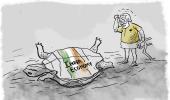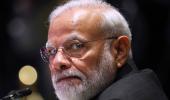'In India, a really popular and well-entrenched leader is not defeated by a rival.'
'Such a leader has to defeat himself,' observes Shekhar Gupta.

A hundred-plus days into the Chinese 'dharna' in Ladakh, six months into the coronavirus crisis and in the fourth year of economic growth decline, the many critics of Narendra Modi are exasperated.
Why are the people, hurting so badly, not turning against him?
Aren't they hurting?
Has Mr Modi subjected them to some kind of a spell, conjuring up a collective suspension of disbelief?
Is it black magic?
Although that is something you've been hearing in a very different context, a star's death and his live-in girlfriend.
It is nothing of the sort.
This is the way Indian politics is.
Ask people if they are hurting, they will say yes. Do you blame Mr Modi? Remember, many of the most miserable migrant workers walking back home hundreds of miles away were still saying, 'What could Modiji have done? He took the risk to save lives'.
Similarly on China, the economy.
It takes time cleaning up the mess of 'seventy years'.
The Congress left a weak military.
Corruption had to be countered first.
Coronavirus? He ordered a total lockdown in time at great risk and cost, he evangalised masks and social distancing and never trivialised the pandemic unlike Boris Johnson, Donald Trump or Jair Bolsonaro.
What can he do if this wretched virus wouldn't listen to him?
If you are a Modi critic, I know that I am getting you even more exasperated.
Because that is the idea.
To understand hard politics, you have to accept the reality, however rude.
You can find a hundred flaws in the latest India Today Mood of The Nation poll.
Yet, it has a good track record. Now it puts Mr Modi's popularity at its highest point at arguably the most messed up point of our economy, national security, internal cohesion and a pandemic in his six years.
So what's going on?
Take a walk anywhere, and ask strangers who will admit they are hurting, if they regret voting for Mr Modi.
If there is an election again, who will they vote for? And do they see a choice emerging? I am sorry, if the answers get you even more exasperated.
Are the people nuts then?
Let me put this differently to you.
What do ordinary people do when hospitalised by a terrible sickness? They trust the doctors. They are the ones who wear white coats. They are trying their best.
The choice of changing hospitals is rarely exercised.
That's how a lot of Indian voters, hurting severely for many reasons, look at their situation now.
There's been a flurry of advice lately from the pundits on how to defeat Mr Modi and what not to do.
Get the Opposition together, is the old trope.
It never works against a truly entrenched leader. Check out Indira Gandhi in 1971 against the Grand Alliance.
Get all Left and secular forces together. Yawn.
The Left here was always a red herring, the basic politics was using caste to keep divided what somebody was working to unite using the Fevicol of religion. That battle is over.
If Narendra Modi, accompanied by the Uttar Pradesh chief minister, governor and the RSS chief, leads the ceremonial bhoomi puja at Ayodhya and nobody in the Opposition, with the exception of Asaduddin Owaisi speaks out against it unqualifiedly, you know that old, post-1989 Mandir versus Mandal story is over.
See the political map of India.
State by state, where do you see leaders who could mount a credible challenge to Mr Modi? Amarinder Singh, Mamata Banerjee, ok.
Now name a third. Tamil Nadu, Kerala, Andhra Pradesh and Telangana stay out of this yet. But already the families ruling the latter two are supplicants of the BJP on the big issues that really matter to it. Just like in Odisha.
Other possibilities? Change the leadership of the Congress.
Let Rahul Gandhi go. Who would replace him? Some would say his sister, some would want no Gandhi. There is also a suggestion that the Congress re-consolidate, bringing in all of the prodigals, Mamata, Sharad Pawar, Y S Jagan Mohan Reddy, even the Sangmas.
But have you asked them if this is what they'd want? And even if they agree, who would lead them?
All of this is pure fantasy at this point.
All of it involves too many assumptions, too much wishful thinking, too many moving parts to build a functioning machine.
Which brings us to a concept, quite familiar to the smarter people I believe, but which I was told about just the other day.
Collateral benefit of a visit to the India International Centre lounge after five months. It is called Occam's Razor.
Now, William Occam (also spelt Ockham), born circa 1285 AD England, grew to be an Anglican priest and was no rationalist.
He developed a theory, instead, to justify and rationalise divine miracles.
His idea, that when there were many competing theories to predict what might happen, or why something happened, then the simplest of these was going to be correct.
To make it simpler still, the fewer assumptions you need to make in arriving at a conclusion, the more plausible it will be.
Conversely, if you made too many assumptions, you were going to go wrong.
He used it so often, and was so successful with his future-gazing that this was immortalised as the principle of Occam's Razor.
Presumably because he used it as often as a man might use a razor.
My interlocutor applied this principle to future politics in India.
And as we tossed many scenarios for 2024, he said, see which is the one with the fewest assumptions? It is Mr Modi coming back to power with another full majority.
Every other permutation fails the test of Occam's Razor. Which sent me scurrying to Uncle Google to read up a bit.
If you keep it simple, therefore, toss all wishful thinking, and look back on your own political history you might see some light.
In India, a really popular and well-entrenched leader is not defeated by a rival.
This is irrespective of which side of the fight a Gandhi is on.
Such a leader has to defeat himself. Or herself, as with Mrs Indira Gandhi in 1977.
And Rajiv in 1989. Even Atal Bihari Vajpayee lost in 2004 not to a defined challenger, but to his own party's double-edged arrogance of advancing an election and then declaring 'India Shining' much too prematurely.
So, what do you do then if you can't stand Mr Modi and do not have a Green Card ready? Do you wait for him to defeat himself? Or, go beyond wishful thinking and do something different, harder?
The conventional way to fight a popular, strong leader is to find another leader with charisma, ambition, endless patience and a new idea.
If politics is a mega market place, you need product differentiation.
Unless all of that comes together, Mr Modi is impregnable.
You can pray to your favourite god and hope he will defeat himself like those in the past we just named.
By Special Arrangement with The Print
Feature Presentation: Aslam Hunani/Rediff.com













 © 2025 Rediff.com -
© 2025 Rediff.com -